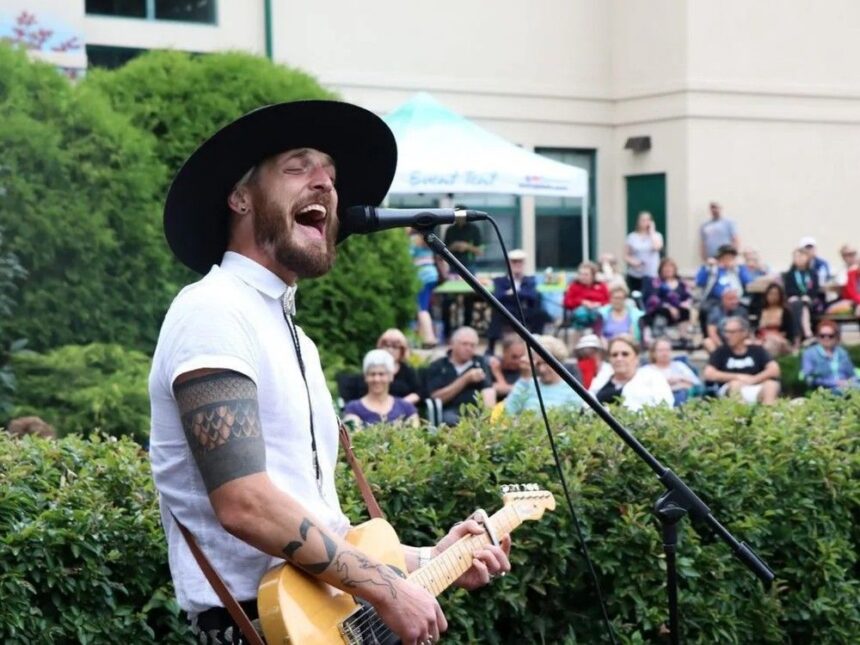The embers of tradition are set to glow once again as Stony Plain’s beloved Cultural Campfires program returns for summer 2024. After drawing hundreds of visitors last year, these Thursday evening gatherings at Heritage Park promise to deliver another season of storytelling, music, and community connection under Alberta’s vast summer sky.
I visited the final campfire event last August, watching as families spread blankets across the grass while elders and children alike gathered around the crackling fire. The program has become something of a ritual for many local families since its inception in 2018.
“We created this as a way to honor our diverse heritage and bring people together in a really authentic way,” explains Chantelle Laberge, Cultural Services Coordinator for the Town of Stony Plain. “There’s something about sitting around a fire that breaks down barriers between strangers. People actually talk to each other here, without their phones.”
The weekly events run every Thursday from July 4 through August 22, from 6:30 to 8:00 p.m. Each evening features a different cultural theme, with Indigenous teachings and traditions opening and closing the series. Between these bookends, attendees will experience Ukrainian, French-Canadian, Japanese, and other cultural performances representing the mosaic of communities that have shaped the region.
Last year’s attendance averaged 75-100 people per evening, with the Indigenous-themed nights drawing the largest crowds. According to data from the Town of Stony Plain’s Cultural Services Department, about 40% of attendees were families with young children, while another 35% were seniors seeking meaningful community engagement.
When I spoke with Rita Wildcat, an Elder from Enoch Cree Nation who led last summer’s closing ceremony, she emphasized the intergenerational importance of these gatherings. “Fire is central to our teaching methods. When young people sit around that fire, something shifts in how they listen. It’s how we’ve passed knowledge for thousands of years, and it still works.”
The campfires aren’t just cultural showcases—they’ve become important community builders in a region experiencing rapid growth. According to Statistics Canada, Stony Plain’s population increased by nearly 10% between 2016 and 2021, bringing new residents who often feel disconnected from the town’s historical roots.
“We’ve seen friendships form between people who might never have met otherwise,” says Laberge. “A retired farmer who’s lived here his whole life sitting next to a family that just moved from Toronto—by the end of the night they’re exchanging phone numbers.”
Each campfire follows a similar format: opening remarks, a cultural performance or demonstration, an interactive component where attendees can participate, and time for casual conversation. Simple refreshments like bannock or culturally relevant snacks are often provided, though attendees are encouraged to bring their own lawn chairs, blankets, and water bottles.
The interactive elements vary widely by theme. During Ukrainian night, visitors might learn traditional dance steps; Indigenous evenings often include hands-on crafts or language lessons; and musical nights invite singing along to folk songs with provided lyric sheets.
What makes these gatherings particularly special is their location. Heritage Park sits at the junction of three trails that have historically connected communities across the region. Long before European settlement, these pathways served as Indigenous trading routes. Later, they guided settlers to establish what would become Stony Plain.
“We’re literally sitting in a place where people have gathered for centuries,” explains local historian Martin Beauregard, who often shares stories about the area’s past during the French-Canadian campfire night. “When we light that fire, we’re continuing something that goes back generations.”
The program isn’t without challenges. Alberta’s unpredictable summer weather occasionally forces events indoors to the nearby Pioneer Museum, though organizers say this happens only once or twice per season. And striking the right balance between education and entertainment requires careful planning.
“We don’t want it to feel like a classroom, but we do want people to walk away having learned something meaningful,” says Laberge. “The sweet spot is when learning happens through experience and connection rather than lecturing.”
The Cultural Campfires program receives funding through a combination of municipal support and a grant from Canadian Heritage’s Building Communities Through Arts and Heritage program. The relatively modest annual budget of approximately $15,000 covers performer honorariums, supplies, staff time, and promotion.
What makes the program particularly sustainable is its simplicity. “We don’t need elaborate technology or expensive infrastructure,” Laberge notes. “It’s probably one of the most cost-effective cultural programs we run because the format is so elemental—just people, stories, and fire.”
For newcomers considering attending their first campfire this summer, local resident Sophia Yaremko offers this advice: “Come with an open mind and don’t rush off after it ends. The official program is wonderful, but some of the best conversations happen in those thirty minutes afterward when people linger around the fire.”
As communities across Canada search for meaningful ways to bring people together across cultural and generational divides, Stony Plain’s Cultural Campfires program offers a compelling model—one that draws on humanity’s oldest tradition of gathering around flames to share stories under the stars.
The 2024 Cultural Campfires schedule will be posted on the Town of Stony Plain website by early June, with program details and featured performers announced weekly throughout the summer season.






